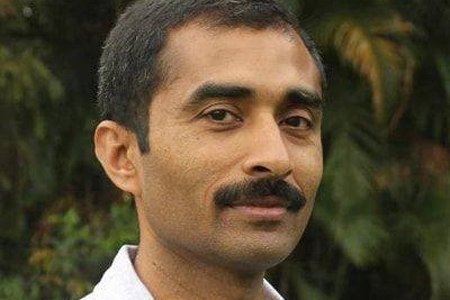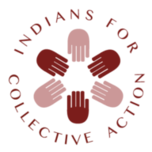
Lijo Chacko has been to the depths of the ocean as a submarine commander, and to the heights of the earth when he scaled Mt. Everest. A few months ago, on level ground, he was struck by COVID-19. Lijo, who is Executive Director at The Vasudhaiva Kutumbakam Foundation, shared his harrowing experience with ICA.
“The support of family and friends is important. If you are one of those unfortunate ones to be severely affected, it is normal that all kinds of ominous thoughts will creep in. There are times when one feels that giving up is the easier route, and that is when one should think what our closest family members will go through if we gave up and passed on, that should help strengthen our resolve to stay strong mentally. Our mental well-being makes so much of a difference”.
ICA: You have been involved with NGOs for some years now. How did your activities change once India took strict measures during the early days of the pandemic?
Lijo Chacko: I have been a fellow traveller to a handful of non-profits, and being physically with the people that you are supporting, at regular intervals, makes a significant difference to them. Since many of those organizations are in rural and in remote areas of the country, not being able to travel took away the personal touch. However, we all tried to make the best of what we could by naturally increasing the time spent on audio and video calls. One unfortunate fall-out was that a multimillion-dollar company which had committed to contributing funds, withdrew their support without even the courtesy of telling us so. And the funds that were committed were only to the tune of USD 20K.
ICA: Where were you when the lockdown began?
Lijo Chacko: I was in Bangalore when the lockdown was enforced and continued to stay there. All travels within India as well as one to attend the Skoll World Forum were cancelled.
ICA: As you worked with NGOs to provide food and other aid to the needy, did you observe precautions being taken all around?
Lijo Chacko: Yes, though more could/should have been done. But when people are queuing up for food with the apprehension that it may get over before their turn comes, it is difficult for NGOs to enforce social distancing or prevent the people from crowding when we get there in our vehicle. We, however, kept trying and the situation did improve considerably. On a couple of instances, the police helped too. Occasionally when we found people had not worn masks, we would send them away with a request to put a mask on and serve food only when they came wearing one. Here is an article on the organization I volunteered with for the food distribution: https://www.karunavirus.org/story/908/a-true-calling-serving-the-hungry
ICA: When did you first think you may have been infected with COVID-19?
Lijo Chacko: We travelled in our own vehicle from Bangalore to Kerala in mid-August. We took food and stopped for fuel and toilet breaks. At Coimbatore we stopped for about half an hour for a small repair to our vehicle’s AC at an authorised service centre, where all sanitising and social distancing protocols were observed. A couple of days after reaching Kerala, I developed high temperature, that was the first sign.
ICA: When and how did you get tested?
Lijo Chacko: On the advice of friends who are doctors and who wanted to check whether it was a normal virus attack which normally subsides in a week’s time, I was on paracetamol for the first 8 days, at home itself. When I realized that the temperature was just not going down after all these days, I got myself tested by an authorised testing agency who sent their representatives home to do the RT-PCR test. The agency staff were fully equipped with PPE and collected my samples. By about noon the next day I received my results which declared me COVID-positive. The labs have been directed by the government to provide them the details of all positive cases so they inform the health department as a matter of procedure.
ICA: What were your symptoms?
Lijo Chacko: I had continuous high fever for days together. I felt as if I was being thrown about on the bed. I blacked out on occasions too.
ICA: Tell us about your experience. What treatment did you get, where, and for how long?
Lijo Chacko: I was hospitalised for 9 days at Pushpagiri Hospital at Tiruvalla, Kerala. At the hospital I was again given paracetamol/Dolo to keep my temperature under check. Additionally, they gave me Zinc and Vitamin C tablets. After a couple of days when I was growing weaker, I was administered glucose and salts intravenously. Another couple of days later, since the temperature was not coming down, I was given 8 ml of Dexamethasone steroid every morning. Once my fever disappeared, the dosage was reduced on a progressive basis.
ICA: We have all heard so many varying things about the symptoms, and the progression of COVID. What can you share with us? Was there anything that surprised you, that you did not expect?
Lijo Chacko: To start with is of course the notion that if you are reasonably physically fit one could bear the onslaught of such a virus/disease without much difficulty, went out of the window! I (and the doctors at my hospital too) agreed and realized in equal measure that we did not know what to do or how to battle the disease. I used to have spells of shivering which lasted for quite a long time, so much so that someone had to physically hold me to stop shivering. A bout of cough also would lead me to spells of shivering. The exhaustion levels have to be lived through to be believed. Having food was a difficult task and I had to force myself to eat. I was fortunate not have lost my sense of smell, so the appeal of the aroma of Indian cuisine certainly helped.
ICA: Are you required to be tested periodically?
Lijo Chacko: No. It’s only after I didn’t show any symptoms for 3 consecutive days that the hospital conducted the antigen test. They discharged me from the hospital after the results came out negative. I was advised by the doctor to quarantine for 14 days to ensure that I don’t infect anyone else since I would still be carrying the remnants of the virus; I was told the viral load wouldn’t be zero.
ICA: Was contact tracing done to learn who you might have been exposed by, and whom you might have exposed?
Lijo Chacko: Doctors of the hospital that I was admitted to and the Health Department workers spoke with me to find that, but I was not really able to pinpoint where I could have contracted the virus from.
ICA: What would you like to share with others, given your experience?
Lijo Chacko: The support of family and friends is important. So, if someone we know has a bad attack of COVID, we should call or message them. They may be too tired and unwell to respond but we should continue to let them know that we are thinking of them and sending wishes to get well soon. If you are one of those unfortunate ones to be severely affected, it is normal that all kinds of ominous thoughts creep in. There are times when one feels that giving up is the easier route, and that is when one should think what our closest family members will go through if we gave up and passed on, that should help strengthen our resolve to stay strong mentally. Our mental well-being makes so much of a difference on our path to recovery.
ICA: Has being a COVID patient changed your thinking, in any way? If so, how?
Lijo Chacko: There quite a few concepts we understand intellectually like – there are creations on this planet that are quite powerful and that we shouldn’t take things for granted. But it is only when we go through such harrowing experiences that we understand the full degree of our fallibility. Such reminders help steady our course in life.
